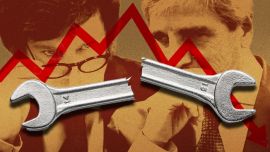There seems to be a complacent assumption in many government circles that negotiations with the International Monetary Fund (IMF) are a slam dunk now that Donald Trump occupies the White House but it may not be so simple. The Javier Milei administration is given full marks for its sustained fiscal surplus and for reducing inflation to a tenth of its previous dimensions between one December and the other but it still has some homework ahead. While most indicators are positive, at least two remain in negative territory – Central Bank reserves and real interest rates – and the IMF would like to see these also brought into line even if soft on ‘cepo’ currency and capital controls (Austro-Kirchnerism, a statist aberration of the anarcho-capitalist Milei?)
Positive interest rates are a hard ask in an election year since there is already so much austerity on other fronts. The reverse has been absolutely crucial to the success against inflation because by constantly pegging both devaluation and interest rates behind the cost of living figure, price increases have been forced downward when having these two variables chasing inflation would have had the opposite effect – public debt has also been easier to finance due to this policy although currency appreciation has been another upshot strongly questioned by the IMF.
There are no signs of the government risking its electoral trump card of decelerating inflation with either a devaluation or higher interest rates but there is movement towards improving reserves – or at least there is a strong case for seeing the recent reduction of farm export duties in that context. For over a year Economy Minister Luis Caputo had been telling farmers that any relief would have to be subordinated to the prime need of ensuring fiscal surplus and as recently as 10 days ago they had been offered nothing more than the vague promise of a meeting sometime this month. But suddenly on January 23 Caputo called a snap press conference to announce temporary export duty cuts until midyear (soy from 33 to 26 percent and most other crops from 12 to 9.5 percent) even ahead of having the decree written.
Hard to see this as an abrupt change of heart when there was nothing unconditional about the generosity. The cuts will only go to those cashing in 95 percent of their crops within the following fortnight – this condition plus the midyear deadline points to an urgency to pump dollars out of farmers often inclined to hold back because of lower global commodity prices. Caputo’s change of tack within hours of returning from Washington would seem to indicate that he had been subjected there to renewed pressure from IMF officials to improve the reserves. While the export duty cuts will surely remain conditioned, whether this system will expire in midyear on the eve of the Rural Society farm show in Palermo and with the midterms only three months away is another question.
Trump’s noisy entry into the White House not only seems to have caused the La Libertad Avanza administration to take for granted a cash-laden deal with the IMF but also a free-trade agreement with the United States. At a time when Argentina is occupying the pro-tempore presidency of Mercosur, Milei has jumped the gun by announcing that he would leave the regional trade bloc if necessary for a free-trade agreement with the protectionist Trump when it is nowhere near even being off the ground. Here currency appreciation rears its ugly head – without a competitive exchange rate this agreement would be murder for Argentina’s trade balance while a hitherto protected productive sector long confined to the domestic market would be even less competitive. With devaluation out of the question due to the risks of reviving inflation, there would be little choice but to accelerate the tax, labour and other structural reforms to slash the “Argentine cost” handicapping local companies – but such reforms would only be viable after presumably favourable midterms, by when Argentina would no longer be calling the shots in Mercosur. All of which is not to say that Milei is wrong in seeking to revamp a Mercosur excessively geared to protecting the Greater Buenos Aires and São Paulo industrial lobbies.
One paradox of this atypical libertarian administration is that it has been a rare case of not enslaving its agenda to the midterms (which for that reason could be usefully scrapped along with the PASO primaries) but in any case ends up in hock to them due to other factors.


















Comments